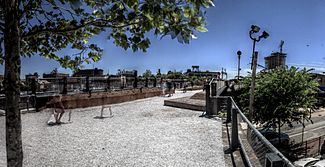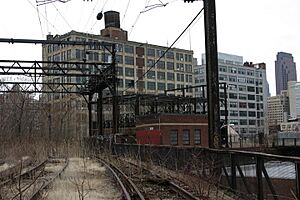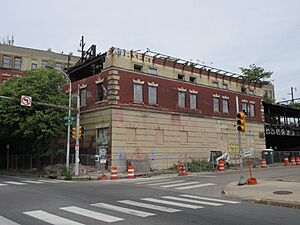Reading Viaduct facts for kids
Quick facts for kids Reading Viaduct / The Rail Park |
|
|---|---|

View of Phase I of the Rail Park from just west of the 12th Street overpass
|
|
| Type | Elevated urban linear park; public park |
| Location | Philadelphia, Pennsylvania, U.S. |
| Status | Open |
The Reading Viaduct, also known as The Rail Park, is an old elevated railway line in Philadelphia, Pennsylvania. It has been partly turned into a cool rail trail or park. This viaduct first opened on January 29, 1893. It used to lead trains to Reading Terminal in the middle of Philadelphia.
The railway line was no longer used after 1984. This happened when a new train tunnel, the Center City Commuter Connection, opened. In 2010, people started thinking about turning the abandoned viaduct into an elevated park. The first part of The Rail Park officially opened on June 14, 2018.
Contents
The Rail Park's Story
From Trains to Trails
The Reading Viaduct was built by a company called the Philadelphia and Reading Terminal Railroad. It was made to help trains reach the new Reading Terminal. The viaduct and the terminal both opened on January 29, 1893. The main part of the viaduct, called the Ninth Street Branch, had four tracks for trains.
In 1984, the Reading Terminal closed down. A new train tunnel opened, making the viaduct unnecessary. The southern part of the viaduct was taken down in 1990. This made space for the Pennsylvania Convention Center. The rest of the viaduct stayed because it was too difficult and costly to remove. Also, it had pollutants that needed to be cleaned up first.
A section called the City Branch also existed. It was about 1,000 feet (300 m)* and went west. This part was used until 1992, mainly for freight trains.
Creating The Rail Park
Phase One: Opening the Park
By the 1990s, there were ideas to turn the old viaduct into a park. Two local artists, John Struble and Sarah McEneaney, started a group called Friends of the Rail Park in 2004. They were inspired by similar parks, like the Promenade Plantee in Paris and the High Line in New York City. Even though the viaduct was closed, people still snuck onto it, leaving trash behind.
Planning for the park sped up in 2009. A group called the Center City District joined the project. A study found that building a park would cost $36 million. Demolishing the viaduct would cost even more, about $50 million.
In 2010, the Center City District and Friends of the Rail Park began raising money. The park plan was included in Philadelphia's city plans the next year. However, some people in the nearby Chinatown neighborhood worried the park would change their area too much.
In 2014, the city and state governments agreed to help pay for the park. The city gave $1.8 million to start. Bryan Hanes was chosen to design the first part of the park. Construction began on October 31, 2016.
The first phase of The Rail Park added a boardwalk, benches, plants, and swings. The opening was delayed because a bridge supporting the park needed repairs. Finally, the first phase opened to the public on June 14, 2018. It cost about $10.3 million. The city's mayor, Jim Kenney, hoped the park would help the area grow. Since 2019, the park has hosted public art festivals.
Phase Two: Expanding the Park
Supporters are working to raise $60 million for the second phase of the park. This includes cleaning up the environment and buying more land. It's a bit tricky because the railway line was never officially "abandoned." This means it could, in theory, be used for trains again, even though parts were taken down.
The old Spring Garden Street station on the northern part of the viaduct was removed in 2021. Work on the second phase paused for a few years. The unused part of the viaduct became a place where people illegally dumped trash. In June 2022, a city council member suggested a law to let the city buy the rest of the viaduct.
As of August 2025, the company that owns the unused part of the viaduct wants $50 million for it. The city government thinks this is too much. However, good news arrived with grants! The William Penn Foundation gave $2 million in August 2024. The federal government added another $2 million in January 2025. These funds will help with the design of the second phase. The state of Pennsylvania also agreed to provide $475,000. More money is being raised from private groups. The second phase might even connect to a planned project called the "Stitch." This project would create a park over the Vine Street Expressway.
Park Features
The first part of The Rail Park is about 0.25 miles (0.40 km) long. It stretches from Callowhill Street to Noble Street. You can enter the park from Noble Street, where a bridge crosses 13th Street. This entrance is easy for everyone to use.
The park has wooden benches, trees, and raised gardens. There is also a colorful mural on the viaduct. You can find cool industrial-looking steel frames with swing sets. At the other end of the park, there's a staircase down to Callowhill Street. The park is open every day from 7 a.m. to 10 p.m.
The original plans for The Rail Park were even bigger. They included renovating more of the viaduct, extending it further. West of the first phase is an open area called the Cut. This connects to a tunnel that goes even further west towards the Philadelphia Zoo.
See also
- Bloomingdale Trail, a similar elevated park in Chicago
- Dequindre Cut, a converted below-ground park in Detroit
 | Shirley Ann Jackson |
 | Garett Morgan |
 | J. Ernest Wilkins Jr. |
 | Elijah McCoy |



